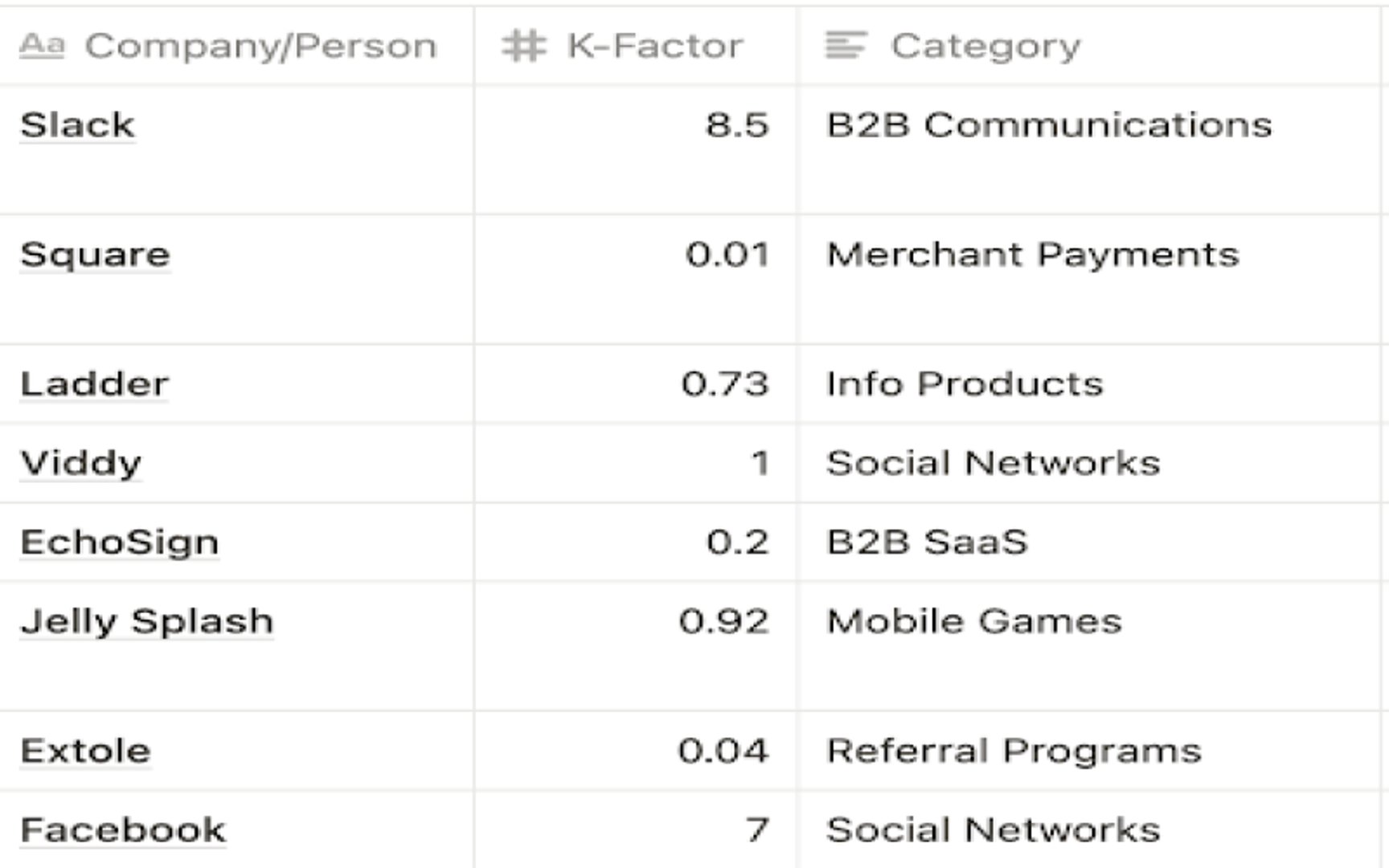Viral Coefficient
Last updated: May 08, 2025
What is Viral Coefficient?
Viral coefficient is the number of new users or customers the average customer generates. This can be through a formal business referrals program or simply through sharing and inviting others customers to use your product - but the key is that these users also convert to paying customers or users.
Viral Coefficient Formula
How to calculate Viral Coefficient
Assume your company runs a formal business referrals program. Out of your entire customer base, 5,000 customers offer an average of 2 referrals to other users, for which the conversion rate is 2%. Using the formula, your Viral Coefficient would be (5,000 * 2 * .02) / 100 = 2. This means that for every new customer there will be an addition of 2 new customers.
Start tracking your Viral Coefficient data
Use Klipfolio PowerMetrics, our free analytics tool, to monitor your data.
Get PowerMetrics FreeWhat is a good Viral Coefficient benchmark?
A Viral Coefficient higher than 1 indicates exponential growth. Here are some virality rates (also known as K-Factor) of well known businesses:
Viral Coefficient benchmarks
Viral Coefficients Benchmark

How to visualize Viral Coefficient?
When tracking your Viral Coefficient metric, make sure you compare the current value to the past, to see how your virality has changed! A significant increase in the Viral Coefficient indicates your viral marketing strategy is succeeding.
Viral Coefficient visualization example
Summary Chart
Viral Coefficient
Chart
Measuring Viral CoefficientMore about Viral Coefficient
Viral Coefficient is a ‘leading indicator’ measure that helps you to predict the future velocity of your growth, as well as predict your costs of acquiring a new customer. It’s also a good indicator of how fast a company can compound its growth.
The Viral Coefficient is another way to measure how much your customers are willing to stake their personal reputation on recommending your product and is closely related to Net Promoter Score, although just because your customers recommend you - doesn’t mean the recipient of that recommendation will become a customer.
While the Viral Coefficient can be a good indication of quality of a product or service - if a company is growing extremely fast through viral recommendations, it needs to be able to back up this growth with scalable on-boarding and support of the new customers.
It also doesn’t tell you how long it will take for the growth to happen or what your churn rate will be. It could even be misleading if the Viral Coefficient is driven through an excellent referral incentive rather than a love of the product.
Finally, it can also be very hard to maintain stable levels of viral growth. That being said - if you can achieve a level of virality where you can maintain service and product quality - nothing can be more powerful for scaling your business efficiently.
Viral Coefficient Frequently Asked Questions
What does a Viral Coefficient of 1 or above mean?
A Viral Coefficient of 1.0+ means each user brings in at least one additional user, creating theoretical self-perpetuating growth without paid acquisition. However, this benchmark requires sustainability across multiple user generations, consistent conversion rates, and favorable viral cycle times to translate into actual exponential growth. Products with coefficients between 1.0-1.2 typically experience linear rather than exponential growth due to market saturation, conversion decay, and activation delays. True viral successes (LinkedIn, PayPal, Zoom) achieved 1.3-1.5 during hyper-growth by combining strong referral incentives with inherent network utility. Strategically, coefficients just above 1.0 reduce acquisition dependence but rarely eliminate it, while coefficients above 1.5 require preparation for rapid scaling challenges including infrastructure strain, support demands, and potential brand dilution.
How can I increase my Viral Coefficient or make my product go viral?
To meaningfully increase your viral coefficient, focus on strategic product-led mechanisms rather than superficial sharing features. Start by analyzing your core value delivery and identify natural expansion points where users genuinely benefit from bringing others in—Calendly and Zoom succeed because scheduling and meetings inherently involve multiple parties. Here are the top 3 tips to make your product go viral:
- Build your product to be exceptional: good design, good user experience and support, and short time to value.
- Add touches that distinguish your product from the sea of options available to your customers.
- Consider giving your customers incentives to refer your product or review your product. A discount can go a long way and still be cheaper than acquiring customers who have never heard about you.
Avoid common pitfalls: bolted-on referral programs typically underperform compared to virality embedded in core workflows, and one-sided incentives generate lower-quality users. For B2B products, focus on functional virality through collaboration features and role-specific value, while consumer products should emphasize emotional sharing triggers—both approaches require ruthless measurement of each funnel step conversion rate to identify and eliminate bottlenecks. Remember that truly viral products solve the "empty room problem" by delivering standalone value before network effects kick in.
What viral coefficient is actually needed to achieve meaningful growth, and how does this differ across B2B versus B2C products?
While conventional wisdom suggests a viral coefficient above 1.0 creates sustainable growth, the reality is more nuanced with timing being as critical as the absolute value. For B2C products, a viral coefficient of 1.2+ typically drives exponential growth, but acquisition loop velocity matters tremendously—a 1.5 coefficient with a 30-day cycle could underperform a 1.2 coefficient with a 3-day cycle. B2B products rarely achieve coefficients above 1.0 but can still benefit substantially from "sub-viral" coefficients of 0.3-0.7, which effectively reduce CAC by 30-70% while maintaining traditional acquisition methods. The most common misconception is treating viral growth as binary rather than a spectrum of acquisition efficiency. For example, Dropbox achieved its renowned growth not through a consistently high coefficient but by optimizing both coefficient (0.5 initially to 0.7+) and cycle time (reducing from weeks to days). Early-stage companies should focus on iteration velocity to identify viral mechanisms before optimizing absolute numbers, while mature companies benefit more from stable "sub-viral" coefficients that sustainably reduce acquisition costs over time.
How can we accurately attribute viral user acquisition to specific features or touchpoints rather than general brand awareness or external factors?
Accurate viral attribution requires sophisticated multi-touch modeling that separates organic discovery from true viral acquisition, focusing on specific referral paths rather than aggregate metrics. The key approach is implementing unique tracking parameters for each viral touchpoint (invite links, share buttons, embedded content) with persistent attribution to distinguish between users who discovered your product through genuine viral mechanisms versus those who joined through concurrent marketing campaigns or organic search. Most organizations make the mistake of overattributing growth to viral channels when much is actually driven by brand effects or environmental factors—a phenomenon I've seen in three different unicorns where apparent "viral growth" collapsed when marketing spend was reduced. The gold standard for verification is conducting isolated cohort experiments: temporarily disable specific viral features for randomly selected user segments to measure their true impact on acquisition rather than relying on correlation analysis. For B2B products, differentiate between broad virality (users inviting external contacts) and network virality (expansion within existing customer organizations), as these require fundamentally different optimization strategies and often produce misleading metrics when combined.
Contributor
